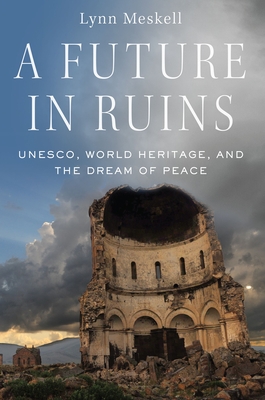A Future in Ruins: Unesco, World Heritage, and the Dream of Peace

A Future in Ruins: Unesco, World Heritage, and the Dream of Peace
Best known for its World Heritage program committed to "the identification, protection and preservation of cultural and natural heritage around the world considered to be of outstanding value to humanity," the United Nations Educational, Scientific and Cultural Organization (UNESCO) was founded in 1945 as an intergovernmental agency aimed at fostering peace, humanitarianism, and intercultural understanding. Its mission was inspired by leading European intellectuals such as Henri Bergson, Marie Curie, Albert Einstein, Thomas Mann, H. G. Wells, and Aldous and Julian Huxley. Often critiqued for its inherent Eurocentrism, UNESCO and its World Heritage program today remain embedded within modernist principles of "progress" and "development" and subscribe to the liberal principles of diplomacy and mutual tolerance. However, its mission to prevent conflict, destruction, and intolerance, while noble and much needed, increasingly falls short, as recent battles over the World Heritage
sites of Preah Vihear, Chersonesos, Jerusalem, Palmyra, Aleppo, and Sana'a, among others, have underlined. A Future in Ruins is the story of UNESCO's efforts to save the world's heritage and, in doing so, forge an international community dedicated to peaceful co-existence and conservation. It traces how archaeology and internationalism were united in Western initiatives after the political upheavals of the First and Second World Wars. This formed the backdrop for the emergent hopes of a better world that were to captivate the "minds of men." UNESCO's leaders were also confronted with challenges and conflicts about their own mission. Would the organization aspire to intellectual pursuits that contributed to the dream of peace or instead be relegated to an advisory and technical agency? An eye-opening and long overdue account of a celebrated yet poorly understood agency, A Future in Ruins calls on us all to understand how and why the past comes to matter in the present, who shapes it, and who wins or loses as a consequence.
PRP: 196.70 Lei
Acesta este Prețul Recomandat de Producător. Prețul de vânzare al produsului este afișat mai jos.
177.03Lei
177.03Lei
196.70 LeiLivrare in 2-4 saptamani
Descrierea produsului
Best known for its World Heritage program committed to "the identification, protection and preservation of cultural and natural heritage around the world considered to be of outstanding value to humanity," the United Nations Educational, Scientific and Cultural Organization (UNESCO) was founded in 1945 as an intergovernmental agency aimed at fostering peace, humanitarianism, and intercultural understanding. Its mission was inspired by leading European intellectuals such as Henri Bergson, Marie Curie, Albert Einstein, Thomas Mann, H. G. Wells, and Aldous and Julian Huxley. Often critiqued for its inherent Eurocentrism, UNESCO and its World Heritage program today remain embedded within modernist principles of "progress" and "development" and subscribe to the liberal principles of diplomacy and mutual tolerance. However, its mission to prevent conflict, destruction, and intolerance, while noble and much needed, increasingly falls short, as recent battles over the World Heritage
sites of Preah Vihear, Chersonesos, Jerusalem, Palmyra, Aleppo, and Sana'a, among others, have underlined. A Future in Ruins is the story of UNESCO's efforts to save the world's heritage and, in doing so, forge an international community dedicated to peaceful co-existence and conservation. It traces how archaeology and internationalism were united in Western initiatives after the political upheavals of the First and Second World Wars. This formed the backdrop for the emergent hopes of a better world that were to captivate the "minds of men." UNESCO's leaders were also confronted with challenges and conflicts about their own mission. Would the organization aspire to intellectual pursuits that contributed to the dream of peace or instead be relegated to an advisory and technical agency? An eye-opening and long overdue account of a celebrated yet poorly understood agency, A Future in Ruins calls on us all to understand how and why the past comes to matter in the present, who shapes it, and who wins or loses as a consequence.
Detaliile produsului










